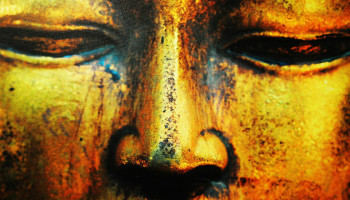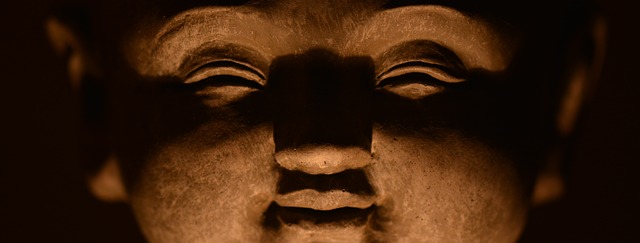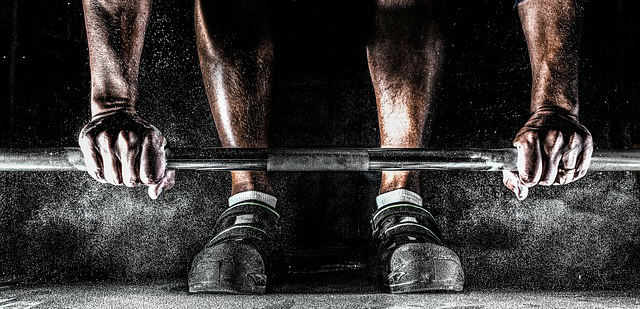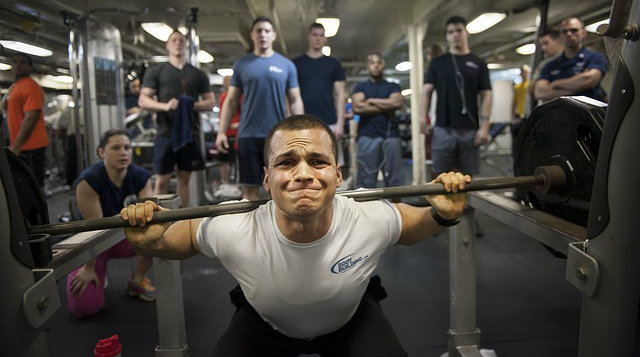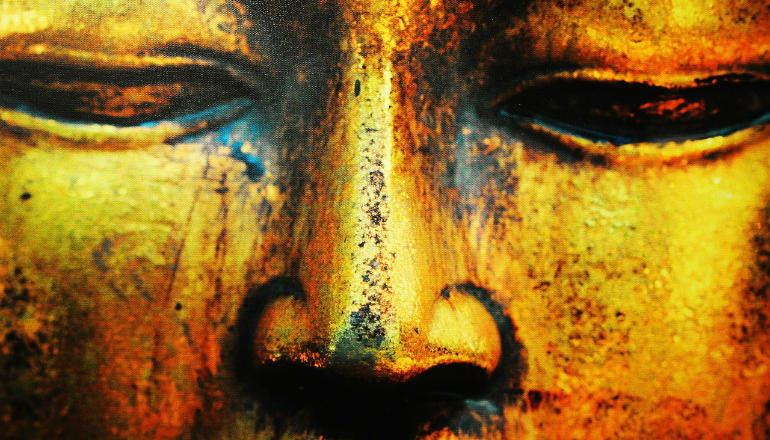 Reading Time: 6 minutes
Reading Time: 6 minutesIt is not uncommon for people in the world of strength, fitness, and health to refer to their time with the barbell as “therapy,” “church,” or even their “safe place.” Despite the commonality of that phraseology, many of us have not taken the time to pause and examine how our time under tension in the weight room might truly fit into our spiritual experience.
Today, we are going to do just that. We will look at the specific ways in which applying the foundational tenet of Buddhism can truly connect us to our authentic, and strong, nature. Through this exploration we can consider the roles of attachment, clinging, and ego in the weight room by viewing these things through the lens of Siddhartha Gautama, commonly known as The Buddha, himself. I have always envisioned that the Hotei Buddha (think round-bellied, smiling Buddha with both arms extended overhead) was smiling because there is an invisible barbell in his hands.
In Buddhism there is a set of foundational tenets known as the Four Noble Truths. The first noble truth is typically translated as, “Life is suffering.” This truth can be the springboard to developing the ability to assess your training, programming, and skill as a contemplative and reflective athlete. We will use this simple sentence – life is suffering – to create an unshakeable foundation for our development as athletes, competitors, and compassionate beings.
The 1st Noble Truth: Suffering as Teacher
To be fair to the cynical view, the Four Truths are normally seen as experiences of living as opposed to concrete rule. For instance, “life is suffering” is related to the concept of choosing to be alive. As long as we choose life, then we must accept that we choose discomfort, as that is a natural byproduct of life.
I, myself, am wired for this mindset. Statements such as, “Everything is as it should be,” and other sayings related to suffering and attachment occur to me as perfect cognitive views. For the sake of this discussion, we will define “attachment” as any way in which we cling to something as permanent in a manner that hinders our growth and potential. For example, we used to deadlift 600lbs. Then aging and a back injury occurred, but we still get furious we are not pulling 600lbs anymore. This is attachment. No growth can come from something that lacks this much compassion and insight. This is the reason I started utilizing Buddhism as a part of my journey toward a stronger version of myself.
Anyone who has taken the time to truly value strength, fitness, and/or health has adopted a level of acceptance of suffering most people could not fathom. In choosing a lifestyle of incremental change, the need to accept the situation as it is becomes paramount. We have to be experts in understanding exactly what is happening in real time in order to take a step forward. Our authenticity is our best friend. We are people who look at failure in loving detail to find the exact change we need to make. It is this appreciation of the details of change that helps us become a self-accepting and self-compassionate athlete.
The Mindful Barbell
It has become a fortunate time to be a lifter. There is less focus on the need to create an enemy out of weights and gravity. There are now more of us implementing a mindset that sees gravity and the barbell as the greatest teachers in our lives. The barbell does not judge, it does not change, it does not fight, and it does not care about our yelling or screaming. It simply waits for us to be ready to move it.
The barbell is a teacher like the Buddha, who once held up a flower silently while at least one person achieved enlightenment. Each potential lift can be that moment for each potential lifter, but it is this same response to achievement that the Buddha warned against. We can utilize each lift as a great moment of enlightenment where we learn new technique, find new strength, and find our connection to the lift. Or we can utilize this moment as a new creator of suffering as we cling to this strength, demand this gain in every lift, expect every day of training to fall right in line, and start to expect credit for our gains.
Your Best Worst Day
It is in this second mindset that suffering and the cycle of dukkha is born. Dukkha is a term that refers to anything that is impermanent. But, of course, all things are impermanent, so our inability to accept dukkha is what creates suffering.
In the weight room this would refer to any time we have been under the impression that today’s good lift could keep us content for the duration of our lifting career. As we have all learned, yesterday’s personal record seems to lose its luster when followed by the next day’s slow progress or missed lifts. If we cling to the need for each day to be our “best day” we will become miserable and lose motivation. The recognition of impermanence is the single most important mental skill a lifter can develop. The ability to see the moment as worthy of enjoyment regardless of its alignment with our expectation is something that can fuel every improvement you will ever see.
Befriending Discomfort
Suffering has historically been something to be avoided, but this very avoidance has been the key to continued suffering for the history of humanity. Our shortsighted attempts to avoid discomfort create everything from poor relationships to drug addiction.
As lifters, we have a unique ability to coerce a strong relationship with suffering. This relationship with suffering can make us resilient, tolerant, and willing to analyze. We become reflective and unattached because we know that is the path to improvement and greater strength. This mindset is unique compared to most of society. We are people capable of learning from the greatest teacher of all – failure.
We lifters are prepared to optimize our skill and movements, but also to change them if they lose effectiveness. We recognize our path as a lifelong journey. We are the lucky ones capable of learning from disappointment and missed marks. We are the ones who get to learn from an ever -present teacher. Our attachment to accomplishment has to be fleeting or we will stall. We rebel against the plateau in combination with our willingness to push past discomfort. We have an opportunity to learn from suffering in the way the Buddha intended. We see suffering as an experience and not a constant.
Choosing Life
As a strength athlete there is a daily opportunity for practice. Everyday we get to reflect on how we are getting in our own way. We can check to see if we are avoiding reality and creating our own suffering. We can analyze the truth of our situation and then activate ourselves forward through our training. We can assess our program, change our lifts, or explore our weaknesses. And we can do all of this outside of our natural human tendency to cling to past accolades and accomplishments.
In closing, let us all, lifters or not, allow for suffering to be our teacher, and in doing this remember that we chose this path of suffering because deep down we already knew that it would be the only way to truly choose life.
